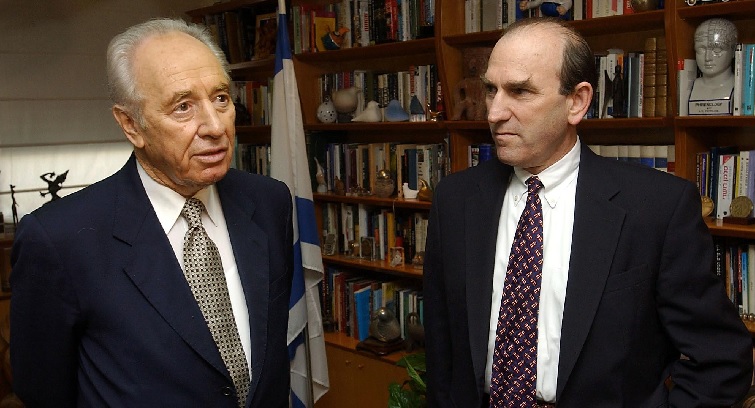A Few Minutes with Elliott Abrams


Elliott Abrams has been involved in the shaping of foreign policy since the 1980s, when he was appointed assistant secretary of state in the Reagan administration. Later, in 2001, he served as deputy national security advisor to President George W. Bush, tasked with promoting the president’s strategy of advancing democracy abroad. At present, Abrams is a senior fellow for Middle Eastern studies at the Council on Foreign Relations and teaches foreign policy at Georgetown University.
I sat down with Abrams after he addressed a packed audience at the Canadian Institute for Jewish Research in Montreal, which recently celebrated its 30th anniversary. I first asked him about Trump’s long-rumored peace plan for the Middle East.
Having talked to members of the administration who’ve read the Trump peace plan, what are your thoughts on it?
My impression is that the plan, which establishes the framework for a two-state solution, is very realistic and a step forward and that it will be very much to Israel’s liking.
[Palestinian Authority chairman Mahmoud] Abbas probably won’t sign it given that he hasn’t signed anything yet. He’s at a stage in his life where he doesn’t want any major fights or to be called a traitor. Nonetheless, it’s useful to put the plan out there so that Palestinians can see it and we can prepare for the days after Abbas. The plan sets a new standard as to what the US thinks a realistic peace plan looks like, especially concerning borders and Jerusalem.
You didn’t support Donald Trump’s candidacy. Are you surprised that President Trump is keeping his campaign promises, particularly vis-à-vis Israel?
It became apparent to me in his first year that he meant what he said, whether that was renegotiating NAFTA, leaving the JCPOA, and moving the US embassy to Jerusalem. He feels bound by these campaign promises and refuses to be controlled by conventional wisdoms. Even though the State Department warned him that violence would erupt everywhere in the Muslim world following the embassy move, Trump didn’t believe it. He was right, and the State Department was wrong. We have new leadership there now. I hope the State Department learned that what we see happening on the Arab street is very often what their government wants to happen.
On October 4, the White House issued its National Strategy for Counterterrorism. How does the Trump approach differ from Obama’s approach?
President Trump appears to be taking a more aggressive stand against terrorism than Obama. He also understands that the key to countering terrorism is tackling Iran, the world’s leading state sponsor of terrorism. President Trump’s withdrawal from the JCPOA wasn’t about terrorism but about nukes, whereas staying in Syria is [about terrorism]. A year ago, we were there because of ISIS, but recent statements by Secretary of State Mike Pompeo and National Security Advisor John Bolton indicate that we won’t withdraw from Syria while Iran is there. Additionally, unlike Presidents Bush and Obama, Trump doesn’t divorce Islamist extremism from the religion itself. Ultimately, Muslims alone can defeat Islamic extremism, not only by imprisoning and killing terrorists but by winning the war of ideas.
You maintain that the Iranian regime is incapable of reform and that its hegemonic ambitions can only be countered by peaceful regime change. How is that possible when Iran owns all the guns?
To defeat the Soviet Union, Reagan applied economic, military, and ideological pressure. Trump appears to be following the same formula: increased sanctions; increased military pressure in the Gulf, denying Iranians easy proxy victories; and exposing the truth about Iran’s human rights abuses and financial outlay to destabilize the Middle East, as outlined in a recent US State Department report.
The Europeans, on the other hand, want to save the JCPOA, as well as maintain stability and avoid conflict, despite evidence that Iranians are fed up with this regime. I recently reminded French officials that the Iranians repaid their outstretched hand by planning a terror attack in Paris. That is Iran’s answer to France’s moderation. I tell Europeans that they cannot allow the Iranians to set the agenda in the Middle East.
What are your thoughts on the ideological developments within the Republican and Democratic parties, especially as regards Israel?
To the extent that the Republican Party has become more populist, there’s good and bad there. There’s nothing good about being the party of rich people. When I came into the Republican Party, there were the Reagan Democrats, working-class people who felt disconnected from the Democratic Party. Trump understands people like them. When he speaks about immigration, he represents the views of tens of millions of Americans. The same with foreign trade: It might lift the gross national product, but there are thousands of people losing jobs because of Chinese competition. To the degree that the Republican Party reaches out to blue-collar Americans, that’s a good thing.
Regarding Israel, since the Eisenhower- Nixon years, the Republican Party has shifted toward a more pro-Israel position, primarily because of evangelical Christians. At the same time, the Democratic Party moved to the left on this issue, which isn’t surprising given that the left has become anti-Israel everywhere in the world. In the US, this shift is a bit masked because the Democratic Party leadership — Joe Biden, Nancy Pelosi — are pro-Israel. Unfortunately, the next generation isn’t as committed to Israel. That should be a warning.
Maintaining support for Israel is a struggle to be fought within the Democratic Party. Democrats, especially Jewish Democrats, need to better make the case for Israel, especially among its up and coming leaders such as Senator Kamala Harris. Similarly, AIPAC needs to reach out more to Hispanic Americans, Korean Americans, and all growing immigrant groups that don’t have traditional ties to Israel. Criticizing [Israeli prime minister] Netanyahu is not the way to go.
(Originally featured in Mishpacha, Issue 732)
Oops! We could not locate your form.













